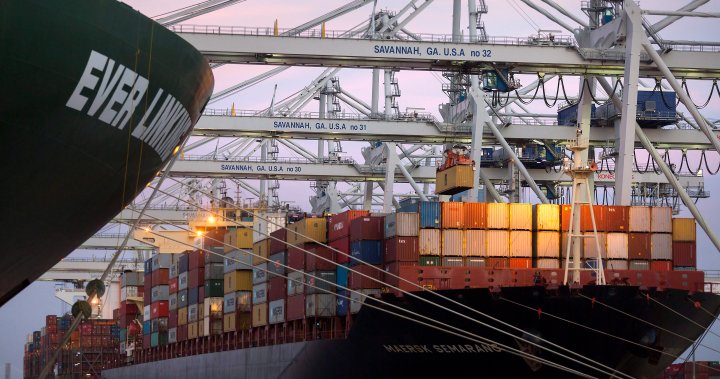Canadian businesses are nervously bracing for the impacts of a fast-approaching dockworkers strike at U.S. East Coast ports that could cripple continental supply chains — a situation that could become even worse if the labour disruptions spread north.
The International Longshoremen’s Association (ILA), which represents roughly 45,000 dockworkers at 36 seaports from Texas to Maine, have threatened to walk off the job on Oct. 1 if they don’t reach an agreement on a new contract with the United States Maritime Alliance (USMX) of shipping companies.
Talks are at an impasse, and neither side is backing down. USMX on Thursday said it filed an unfair labour practice charge with the U.S. National Labor Relations Board, alleging the union is not bargaining in good faith, and has been in talks with federal mediators. The ILA says it wants to negotiate but has called the employers’ wage offers “a joke” and “insulting.”
The Canadian Chamber of Commerce says $3.6 billion worth of goods and services cross the U.S.-Canada border every day. A large amount of imports come into Canada through the U.S. East Coast ports, which are able to handle far more capacity than the Port of Halifax and Port of Montreal, the main Canadian shipping points on the Atlantic.
A shutdown of those U.S. ports would threaten the delivery and viability of much of those goods, business groups say.
“There’s a lot of concern,” Pascal Chan, the Canadian Chamber of Commerce’s senior director of transportation, infrastructure and construction, told Global News.
“Any significant disruption can really jeopardize the livelihoods of workers across multiple industries on both sides of the border.”

Even goods that arrive at Canadian ports, Chan said, typically need to wait behind goods destined for the U.S., with containers often “buried” underneath ones that are unloaded at U.S. ports first.
Shippers have already begun rerouting to west coast ports through the drought-plagued Panama Canal in recent weeks in anticipation of an east coast strike, which has added additional costs to containers. Those companies could also send some of their ships to the ports of Montreal and Halifax despite their lower capacity.
But the latter strategy is facing uncertainty as well.
What could happen in Canada?
On Wednesday, dockworkers at the Port of Montreal approved a strike mandate after more than a year of contract negotiations. The union, which last went on strike in 2021, has not yet issued a 72-hour strike notice.

Get daily National news
Get the day’s top news, political, economic, and current affairs headlines, delivered to your inbox once a day.
Business groups are also eying a potential shutdown at ports in British Columbia, where dockworkers informed their employer early this month that they had approved their own strike mandate. The B.C. Maritime Employers’ Association has gone to the Canada Industrial Relations Board, which has yet to issue a decision.
“You could have a situation where you have a strike in the U.S. on East Coast ports, and you would also have a strike at the Port of Montreal, and you could also have a strike at B.C. ports. And that would have a massive, massive impact,” said Jasmin Guenette, vice-president of national affairs at the Canadian Federation of Independent Business.
A B.C. port strike last occurred in 2023 and led to months of supply chain backlogs.
This week also saw some 600 unionized grain terminal workers go on strike in B.C., threatening grain exports in the middle of harvest season.

The Port of Vancouver, which would be impacted by a B.C. dockworkers strike, said in a statement it has not seen an uptick in traffic related to the labour dispute on the U.S. East Coast, and expects most affected trade would be re-routed to U.S. West Coast ports “for now.”
“That said, the Port of Vancouver is open for business and well positioned to take on additional volumes,” the statement said. It did not mention the possibility of a strike by its own workers.
Unlike the ports of Montreal and Halifax — which took in one-fifth and seven per cent, respectively, of the containers brought in by the Port of New York and New Jersey last year — the Port of Vancouver has similar capacity to large U.S. West Coast ports like the Port of Los Angeles.
How severe could the strike be?
As Oct. 1 approaches, seaport executives and analysts are saying a shutdown is looking likely — and the economic impact could be severe.
An analysis by national security firm MITRE estimated a strike would lead to an impact of US$640 million a day just at the Port of New York and New Jersey alone.
JPMorgan transportation analysts told the New York Times this week that a strike could cost the entire U.S. economy US$5 billion a day, or about six per cent of gross domestic product expressed daily, and that even a one-day strike would create a backlog that would take up to six days to clear.
A Moody’s analysis shared by the firm with Global News on Wednesday said a strike “lasting more than a week or two would result in rising prices and noticeable shortages of manufacturing inputs and retail goods.”
It said the automotive sector would struggle as inventories of imported components dwindle, and agricultural imports and exports would slow.
Two of the impacted East Coast ports, the Port of Savannah and the Port of Baltimore, oversee a majority of North American auto imports.
Chan said the Canadian Chamber of Commerce is in the process of doing its own economic impact assessment. But he noted businesses are still recovering from the impacts of last month’s four-day-long shutdown of Canada’s main railways, which also snarled cross-border supply chains.

The Chamber has estimated the rail shutdown impacted $3 billion worth of goods, and Chan said a vast majority of business owners are fearful of more supply chain issues to come.
“Our ability to reliably get those goods to and from market really determines whether Canada’s going to be competitive in the global economy,” he said.
Guenette, with the CFIB, said smaller businesses will have a harder time mitigating the impacts of a port shutdown and supply chain snarl compared to large firms like Walmart, which began increasing imports this summer in anticipation of a strike to prepare for the holiday shopping season.
“Typically, small businesses are the collateral damage in these situations,” he said. “They simply don’t have the resources to bring in more product or change transportation options, which come at a huge cost.”
U.S. President Joe Biden has publicly dismissed calls to intervene in the U.S. port workers’ dispute.
But the White House says it has been monitoring the situation, and Reuters reported this week Acting Labor Secretary Julie Su is prepared to get involved in the negotiations. Su was seen as instrumental in securing an agreement between U.S. West Coast ports and workers last year that avoided a strike.
U.S. presidents can intervene in labour disputes that threaten national security or safety by imposing an 80-day cooling-off period under the federal Taft-Hartley Act, forcing workers back on the job while negotiations continue.
Moody’s predicted the “severe” economic impact — particularly so close to a presidential election where cost of living has been a top issue — could push the Biden administration to step in.
Dozens of U.S. business groups have written to Biden urging him to invoke the act and avoid an economic catastrophe.
Canadian business groups say they’re prepared to voice their concerns as well if the situation worsens.
“This is significant for all our members, given how closely integrated we are with the U.S.,” Chan said.
— with files from Reuters











